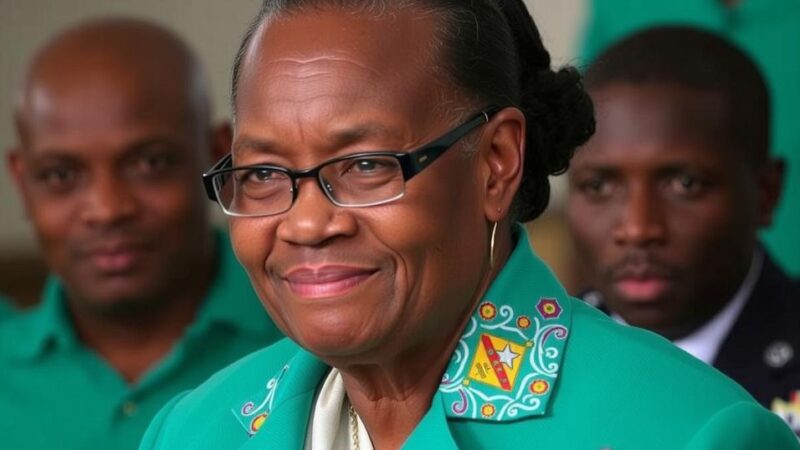Abbas Alawieh and other activists express concern over Donald Trump’s electoral victory in Dearborn, reflecting a shift in the Arab-American community away from the Democratic Party due to its disconnection on key issues like U.S. foreign policy towards Israel and Palestine. Despite casting votes for Democrats, many are disillusioned by their leaders’ failure to engage and respond to local grievances, signaling a complex and evolving political landscape for the future.
On the recent election night, Abbas Alawieh, a Palestinian-American from Dearborn, expressed no astonishment as Donald Trump garnered more votes than in 2020, successfully securing a victory. Alawieh, a lifelong Democrat and former chief of staff, had previously joined efforts with other Palestinian Americans to establish “Listen to Michigan,” a coalition urging voters to express dissatisfaction with President Biden’s steadfast support for Israel by voting “uncommitted” in the Democratic primary. This initiative attracted over 100,000 voters, seeking to compel a reconsideration of Biden’s policies towards Gaza. After Kamala Harris joined the presidential ticket, the movement broadened nationally, leading to the election of 30 uncommitted delegates to the Democratic National Convention. Alawieh actively advocated for the inclusion of a Palestinian American speaker, yet encountered resistance from Democratic leadership, expressing disappointment at their refusal to engage with their community’s concerns. The recent election results illustrate a growing disparity between the Democratic party’s leadership and its traditionally supportive Arab American base. Dearborn, known for its significant Arab American presence, witnessed a notable shift in voting patterns, with Trump receiving 42.5 percent against Harris’ 36 percent. The results reflect a disturbing trend for a community that had previously supported Democrats, as voters are now increasingly disillusioned. Alawieh admitted to casting his vote for Harris while recognizing the challenges now facing his community under both Democratic and Republican administrations regarding ongoing U.S. military aid. Layla Elabed, prominent in Dearborn’s anti-war movement and closely associated with the Democratic party, opted not to vote for Harris. She articulated her discontent, saying, “It solidified that our anti-war movement did very little to stop the bombs from killing our people.” Elabed’s sentiments underscore a broader feeling of disillusionment directed towards the party’s leadership rather than the party itself, advocating for a grassroots approach to reconnect with disaffected voters. James Zogby, a veteran advocate for Arab American voters, expressed profound frustration with the Democratic Party’s failure to engage meaningfully with Arab American communities. He criticized the party’s reliance on consultants and their lukewarm campaigning efforts in Dearborn, stating that the party has lost touch with its constituencies. Zogby remains hopeful for future progress, suggesting that if more engaging candidates emerge, disillusioned voters may reconsider their allegiance to the Democratic party. Rola Makki, a Lebanese-American Republican, also articulated a complex emotional landscape following Trump’s victory, balancing relief over his win with grief over ongoing international conflicts affecting her community. She remarked on the significant influence of socioeconomic issues, highlighting a shift in voter sentiment pre-Gaza crisis. This election’s results serve as a cautionary signal for Democrats about their disconnect with pivotal voter demographics. The mood in Dearborn is characterized by skepticism towards Trump while retaining an understanding of the political dynamics in play. Alawieh expressed concerns that the new administration might not prioritize the needs of the Palestinian community, stating, “It is clear as day that he is playing us.” Therefore, local sentiments reflect an impending quest for clarity regarding how these political shifts may ultimately affect them.
The article discusses the electoral dynamics in Dearborn, Michigan, particularly focusing on how the Arab-American community has shifted its support away from traditional Democratic candidates in response to perceived neglect from the Democratic leadership concerning their concerns about U.S. policies in the Middle East, especially regarding Israel and Palestine. Various activists and political participants highlight their frustrations and hopes for future political engagement within their communities. Additionally, it reflects the complex interplay between local sentiments and national politics, illustrating how specific voting patterns signal broader trends within the electorate.
In conclusion, the results from Dearborn’s recent election underscore significant discontent within the Arab-American community towards the Democratic Party, largely driven by their leadership’s neglect of critical issues affecting these voters. Activists like Abbas Alawieh, Layla Elabed, and James Zogby emphasize the urgent need for the Democratic Party to reconnect with grassroots communities to prevent further voting loss. As sentiments evolve amidst ongoing international crises, it remains to be seen what measures will be taken to bridge the growing divide and address the priorities of these constituents.
Original Source: slate.com







